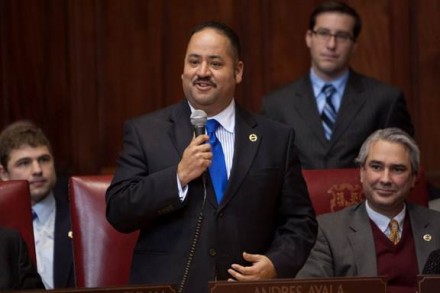
UPDATE: Dennis Bradley qualifies for public grant. The clock is winding down to qualify for public dough in state primary races, according to the Citizens Election Program calendar. Next Friday July 18 is the final day candidates for the August 12 Democratic primary can make the agenda for public money. Two State Senate primaries and two State House primaries lead the action.
Incumbent Anthony Musto and his Democratic primary opponent Marilyn Moore have both qualified for an $83,550 grant to spend in the final weeks of the campaign in Connecticut’s 22nd Senate District covering Trumbull and portions of Bridgeport and Monroe.
Incumbent Andres Ayala has his public loot in the 23rd Senate District. Will City Librarian Scott Hughes make the deadline in time? Hughes must raise $15,000 in small donations to receive the State Senate primary money. As of Thursday afternoon with a week to go, he was about $1,000 short, according to his fundraising page. He’ll also need 300 of those contributions to come from either Bridgeport or Stratford. The Senate district covers about two thirds of Bridgeport and a portion of western Stratford.
On Wednesday, State Rep. Christina Ayala dropped off her information packet with the State Elections Enforcement Commission that overseas the public grant program. She hopes to be on next week’s agenda for public money approval. She must raise $5,000 in donations between $5 and $100 with 150 of the donations coming within the city limits. Party-endorsed Chris Rosario has received his public grant of $27,850. City Fire Commissioner Dennis Bradley received a thumbs-up for his public money on Thursday. Teresa Davidson, a newcomer to elections, is also a candidate in the battle royal. The 128th State House District covers the East Side and Hollow.
Wednesday night House Speaker Brendan Sharkey attended a fundraiser for Board of Education member Andre Baker who’s challenging party-endorsed Ernie Newton in a primary. Baker hopes the money coming in from Sharkey’s visit gets him to the public-money promised land. Newton is raising money outside the voluntary program because a bill supported by Sharkey prohibits his participation dating back to his federal corruption conviction about 10 years ago.
The State House candidates involved in primaries overlap the Ayala-Hughes State Senate primary. State Senate candidates will appear first on the ballot.


Ernie Newton Seeking To Dismiss Criminal Charges
By CHRISTOPHER KEATING, ckeating@courant.com The Hartford Courant
6:30 p.m. EDT, July 10, 2014
HARTFORD – An attorney for former state Senator Ernie Newton said Thursday that he will ask a judge to dismiss seven criminal charges due to a recently discovered audit that he says exonerates Newton of campaign finance fraud.
The defense team never saw the audit by state election officials until recent weeks, but it says that Newton had reached the minimum $15,000 fundraising threshold to qualify for more than $80,000 in public financing in a state Senate primary that he lost in August 2012. The fundraising is at the heart of the criminal charges because the prosecution charges that Newton never reached the threshold and should have never received the public money–leading to a felony count of first-degree larceny for “falsely obtaining thousands of dollars in public funds.”
Attorney Darnell D. Crosland, who represents Newton, read some details of the audit during a hearing in Superior Court, telling Judge Joan Alexander that 357 campaign contributions had been certified as “qualified” under state rules and that the final tally was $15,020–just barely above the threshold.
“Mr. Newton has reached the threshold for qualified funds, which has brought us here,” Crosland told the judge. “We’ve been before this court for about two years. … We’re approaching a Brady issue or a discovery issue because this should have been turned over a long time ago.”
The judge responded that she was not ruling that prosecutors were guilty of a “Brady” violation–meaning that they had not turned over evidence that would prove the innocence of a defendant.
In a rare appearance in court, deputy chief state’s attorney Leonard Boyle–the second-highest ranking state prosecutor–said that the “draft summary” of the audit that was dated June 3, 2013 was a mistake.
“I have reason to believe the 2013 date was in error,” Boyle told the judge, adding that the document should have been dated one year later.
The prosecution charges that Newton came up $500 short of the fundraising threshold and then prompted five campaign workers to sign cards that stated that they had contributed $100 each. The state says that Newton then used the false documentation to gain the public financing.
Crosland, who had not met Boyle before, was surprised that such a high-ranking state prosecutor had arrived in court on the Newton case.
“When you see a supervisor come out, either there’s some smoke coming out of the galley or there’s a fire onboard,” Crosland said. “This ship is definitely sinking.”
Crosland said he will seek to have the case dismissed if prosecutors do not drop the case themselves.
“I think this case should go away, and I compliment Mr. Boyle, who exhibited a real level head today,” Crosland said.
Reached at his Rocky Hill office after the hearing, Boyle declined to comment because the case is still pending.
Despite the charges against him, Newton is running in the August 12 Democratic primary in his hometown of Bridgeport against Andre Baker, a member of the city’s school board. A convicted felon, Newton served more than four years in federal prison after pleading guilty to accepting a bribe and other charges.
During the hearing, Newton formally rejected the prosecution’s plea bargain offer of eight years in prison that would be suspended after he served three years behind bars. The offer included five years of probation on seven counts, including the larceny charge, a felony count of tampering with a witness and five counts of illegal campaign practices.
If the criminal case is not resolved, a trial could be held starting in December.